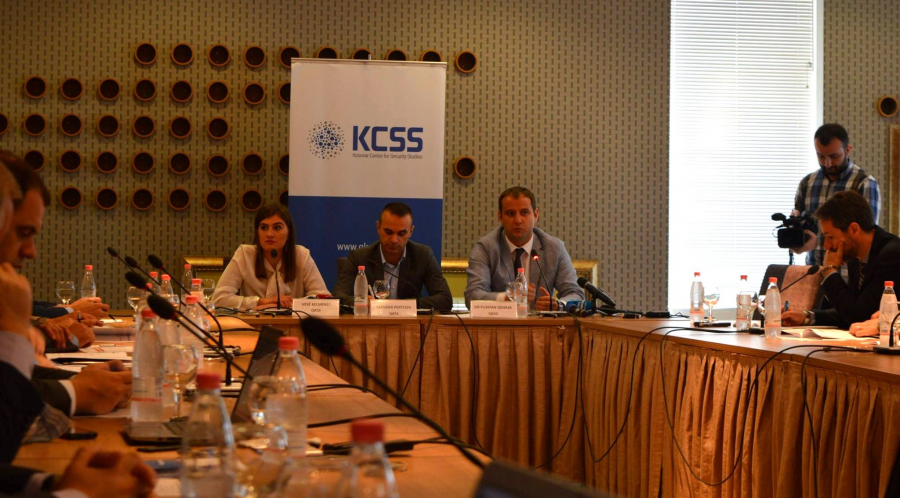13/06/2016

Kosovar Centre for Security Studies, today, on 13th of June 2016, has launched the Special edition of Kosovo Security Barometer (KSB), entitled: “The citizens’ views against violent extremism and radicalization in Kosovo”.
This special edition of KSB is aimed at a wide range of stakeholders interested to follow citizens’ perceptions of violent extremism and radicalization in Kosovo. Specifically, it addresses an audience that is interested to follow the trends of public opinion in Kosovo with special emphasis on Kosovo citizens’ trust in and contact with religious institutions in Kosovo; threats and risks arising from the terrorist formations such as ISIS and Al-Nusra; perception of the rehabilitation of returnees from Syria and Iraq as well as perceptions of the Kosovar Government’s strategy to deal with this phenomenon. In general, BKS is aimed at the state level policy makers, international actors in Kosovo, as well as local organizations, religious communities, civil society, academia and media.
Kosovo is described as a country with a high recruitment and spreading of radical ideology potential. This due to the profiles of participants from Kosovo in Syria and Iraq war, that where included various elements and motifs. However, the KCSS finding shows that 95% of the citizens perceive the participation of individuals in the Syria and Iraq conflicts as a harmful decision. On the other side, 75% of the respondents have a perception that there is a risk from the people who are returning from the conflict in Syria and Iraq, and 55% of respondents have the opinion that the returnees should be rehabilitated back into the society.
The key finding of the KCSS report, shows up that the key factors for this are largely considered to be socio-political and economic, such as: the degraded education system, unemployment among young people (60 percentage in Kosovo)2 , social and individual isolation, the existence of extremist ideology in different regions, and socialization and grouping of young people around these circles. However, an important role was played by the inefficiency of state and religious institutions to prevent the spread of extremist ideology in the Republic of Kosovo, a problem encountered in other countries in the Balkans and Europe. One of the factors that cannot be neglected which has contributed to attracting young people is their isolation in rural areas, induced with lectures by some imams who have already been arrested for recruitment and association with extremist groups.
This special KCSS edition of the security barometer will disclose the level of citizens’ trust in and their contact with religious institutions as well as their perceptions of the threats posed by extremist groups and the risks from people who have returned from the Middle East conflict to Kosovo.
The general trends show that civilian respondents share more positive perceptions towards religious institutions than state ones. Citizens who claimed they trust the Government’s work amount to 14 percent, those trusting the courts to about 22 percent, compared to the religious institutions where the trust is at 57 percent.
Traditionally Kosovar citizens have respected religious institutions in Kosovo, but their views do not necessarily reflect the work conducted by these institutions. A closer examination of the results shows that there are differences between rural and urban areas in terms of trust in religious institutions. E.g. about 65 percent of the respondents living in rural areas trust religious institutions, compared to 49 percent of those living in urban areas. However, contacts with religious institutions are of a low level.
About 76 percent of citizens see terrorist organizations like ISIS and Al-Nusra as very dangerous while 8 percent see these organizations as posing a medium threat.
About 55 percent said that Kosovar citizens who returned from the Syrian and Iraqi wars should be subjected to strict programs of reintegration, rehabilitation, and deradicalization. Another 22 percentage of the respondents think they should be arrested at the very moment of their return to Kosovo, while 15 percent think they should be banned from returning to Kosovo.
Lastly, about 57 percentage of respondents said the Kosovar Government has failed to combat violent extremism and radicalization in Kosova, on the other hand about 35 percentage of the respondents see the Government’s work as somewhat successful in combating and preventing violent extremism in Kosovo.
Otherwise the Kosovo Security Barometer (KSB) is a special program of the Kosovar Centre for Security Studies (KCSS), designed to serve as an annual publication. Apart from general findings, the program issues special editions in areas previously defined. The main focus of the KSB is to measure the perceptions of the public about the institutions and policymaking in the field of security. It also measures the public perception of internal and external threats to security in Kosova. BKS is one of the biggest and the first initiatives designed, implemented, and communicated by a local research institute. BKS is unique in its methodological approach, adapting qualitative and quantitative methods with the aim of providing real results on public perception issues related to security.